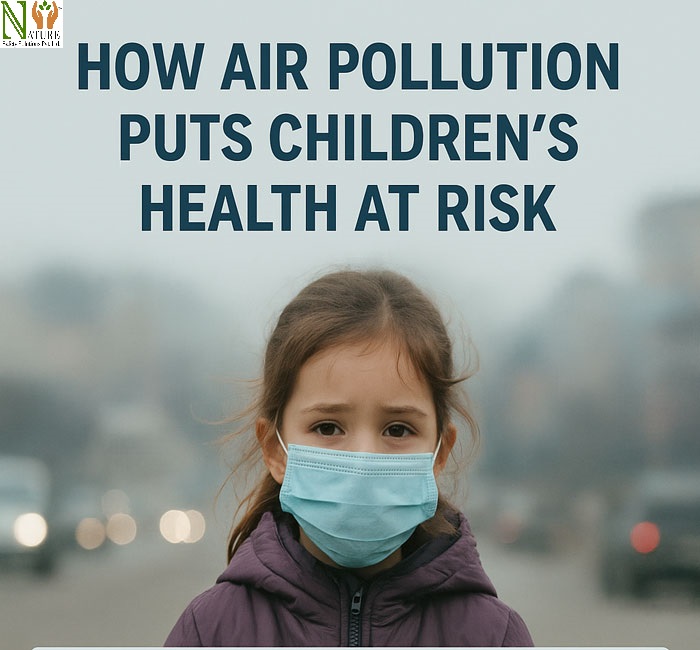Air is something we all need, but not all air is safe. In many cities and towns, the air is filled with dust, smoke, and harmful gases. While air pollution affects everyone, it is especially dangerous for children.
Their bodies are still developing, and their lungs are more sensitive. What they breathe in during childhood can affect their health for the rest of their lives. This article explains why children are more vulnerable, how pollution harms them, and what can be done to reduce the risks.

Why Children Are More at Risk
Children are not just small adults; their bodies work differently. They breathe more times per minute than adults, which means they take in more air relative to their size. If that air is polluted, they also inhale more harmful substances.
Children also spend more time outdoors, running and playing, which increases their exposure. Their height adds another risk. Since many pollutants, like car exhaust, stay close to the ground, children are breathing in these harmful particles more directly.
Where Air Pollution Comes From
Air pollution has many sources. Some are natural, but most are caused by human activities.
- Traffic pollution: Cars, trucks, and buses release smoke, carbon monoxide, and nitrogen dioxide.
- Factories and industries: Power plants and factories release gases and tiny particles into the air.
- Burning waste and fuels: Open burning of garbage or cooking with wood, coal, or kerosene adds harmful smoke indoors and outdoors.
- Construction dust: Building activities and road dust release fine particles that stay in the air.
- Indoor pollution: Cigarette smoke, poor ventilation, and strong chemical cleaners also reduce air quality.
Children are often exposed to a mix of outdoor and indoor pollution every day.
How Pollution Affects Children’s Health
Breathing Problems
Polluted air can irritate children’s lungs, leading to coughing, wheezing, and shortness of breath. Asthma is one of the most common conditions linked to air pollution, and cases are rising in polluted cities.
Slower Lung Development
If children are exposed to harmful particles for long periods, their lungs may not develop fully. This can lead to reduced lung function as they grow older.
More Infections
Pollution weakens the immune system, making children more likely to suffer from colds, pneumonia, or bronchitis.
Effects on the Brain
New studies suggest that air pollution may also affect brain growth. It can reduce concentration, memory, and even lead to learning difficulties or behavioral issues.
Long-Term Illness
Children exposed to pollution early in life may face health problems later, such as heart disease, diabetes, or even cancer.
Warning Signs Parents Should Notice
Parents should watch for symptoms that may be linked to pollution exposure, such as:
- Frequent coughing or wheezing
- Trouble breathing while playing
- Constant tiredness or headaches
- Red or watery eyes
- Worsening asthma symptoms
These signs should not be ignored. Consulting a doctor is important if these symptoms appear often.
Steps Families Can Take
- Monitor Air Quality : Many cities provide daily air quality updates. On days when pollution is high, children should spend less time outside.
- Improve Indoor Air : Do not smoke indoors. Use cleaner cooking fuels instead of wood or coal. Keep windows open for ventilation when outdoor air is better, or use air purifiers if available.
- Choose Safer Play Areas : Parks and green spaces have better air quality than busy roads. Encourage children to play away from traffic.
- Build Stronger Immunity : Nutritious food, regular exercise, and proper sleep help children resist the harmful effects of pollution.
- Use Protective Measures : In areas with very high pollution, children may need masks. These must fit properly and be comfortable to wear.
Role of Schools and Communities
Schools can help by checking air quality before scheduling outdoor activities. They can plant trees around the campus, which act as natural air filters. Communities can also organize awareness programs, discourage burning of waste, and push for clean-energy solutions.
What Governments Can Do
Lasting change comes from strong policies. Governments must enforce rules to reduce vehicle emissions, support public transport, and encourage the use of renewable energy. Limiting industrial pollution and banning open burning of waste are also crucial. These steps not only protect children but improve the health of all citizens.
Also read:-
